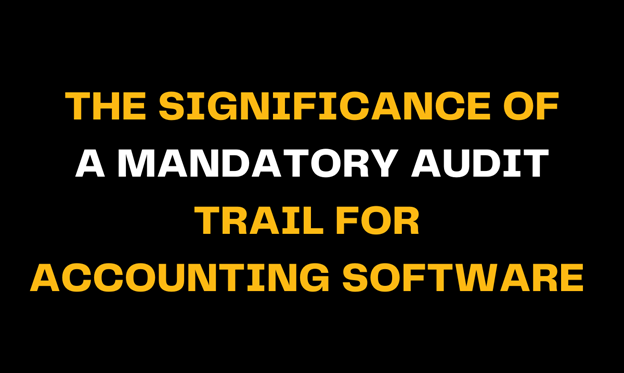Read Time5 Mins
As businesses continue to rely on technology for their accounting and financial management needs, the importance of maintaining accurate and reliable records cannot be overstated. One crucial aspect of maintaining integrity in financial data is the implementation of a mandatory audit trail in accounting software.
In this blog post, we will delve into the significance of a mandatory audit trail and how it benefits businesses in ensuring transparency, accountability, and compliance.
First and foremost, a mandatory audit trail serves as a comprehensive and chronological record of all changes made to financial data within an accounting software system. It captures every action taken, including additions, modifications, deletions, and approvals, along with the corresponding timestamp and user information. This detailed record of activities creates a transparent and verifiable trail of financial transactions, allowing businesses to trace and verify any changes made to their financial data.
Transparency is a key element in financial management, as it ensures that all financial data and transactions are visible and accessible to authorized personnel. With a mandatory audit trail, businesses can track and monitor changes made to financial data in real time, enabling them to detect and address any unauthorized or fraudulent activities promptly. This helps prevent financial fraud and mismanagement, as well as provides a clear audit trail that can be used for investigation purposes in case of any disputes or legal issues.
Accountability is another crucial aspect of financial management, and a mandatory audit trail promotes it by attributing changes to specific users or individuals. Each action recorded in the audit trail includes the user information who made the change, providing a clear picture of who is responsible for each modification. This fosters a sense of ownership and responsibility among users, as they are aware that their actions are being logged and can be traced back to them. This, in turn, encourages users to be more cautious and diligent in their financial data management practices, reducing the likelihood of errors or intentional misrepresentations.
Compliance with regulatory requirements and industry standards is a significant consideration for businesses, especially in the realm of financial management. Many jurisdictions and industry bodies mandate the implementation of a mandatory audit trail in accounting software to ensure transparency and accountability in financial reporting. By adhering to these requirements, businesses can demonstrate their commitment to compliance, minimize the risk of penalties or fines for non-compliance, and maintain the trust of stakeholders, including investors, regulators, and customers.
Furthermore, a mandatory audit trail can be a valuable tool during internal and external audits. Auditors rely on reliable and accurate financial data to assess the financial health of a business and provide assurance on the accuracy and completeness of financial statements. An audit trail provides a detailed record of changes made to financial data, enabling auditors to verify the integrity and accuracy of the data and ensure that all changes are supported by appropriate documentation and approvals. This can streamline the audit process, reduce audit risk, and enhance the credibility of financial statements.
4 additional points highlighting the importance of a mandatory audit trail for accounting software:
- Enhanced Data Integrity: A mandatory audit trail helps maintain the integrity of financial data by capturing all changes made to the data in a systematic and organized manner. It ensures that no changes go unnoticed, and any modifications or deletions are recorded, allowing for easy detection of any unauthorized or fraudulent activities.
- Efficient Error Detection and Correction: With a mandatory audit trail, errors or discrepancies in financial data can be quickly identified and corrected. The detailed record of changes allows for easy tracking of when and how errors occurred, facilitating prompt corrective actions and minimizing the impact of errors on financial reporting.
- Risk Management: Implementing a mandatory audit trail as part of internal controls for financial data management software is a proactive approach to risk management. It helps identify and mitigate risks associated with unauthorized access, data manipulation, and other fraudulent activities, safeguarding the financial integrity of the business.
- Business Continuity: A mandatory audit trail can also contribute to business continuity planning. In case of unexpected events such as system failures, data breaches, or employee turnover, the audit trail serves as a reliable source of information for reconstructing financial data and ensuring business continuity without disruption.
In conclusion, a mandatory audit trail is a critical component of effective financial data management in accounting software. It promotes transparency, accountability, and compliance, enhances data integrity, aids in error detection and correction, facilitates forensic analysis and investigation, supports risk management efforts, and contributes to business continuity planning. To explore how these benefits can be harnessed for your organization, we encourage you to Request an Asset Vantage demo. Prioritizing the implementation of a mandatory audit trail is crucial for safeguarding your financial data and maintaining robust financial controls.







